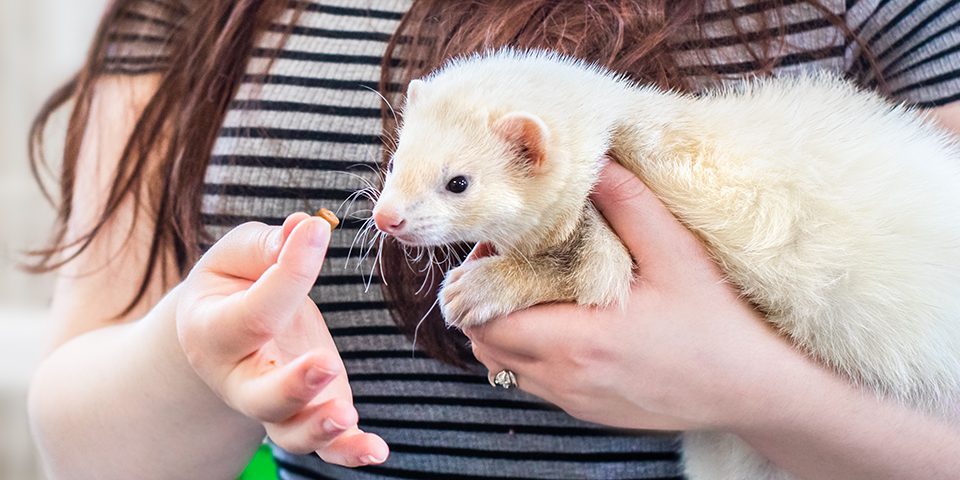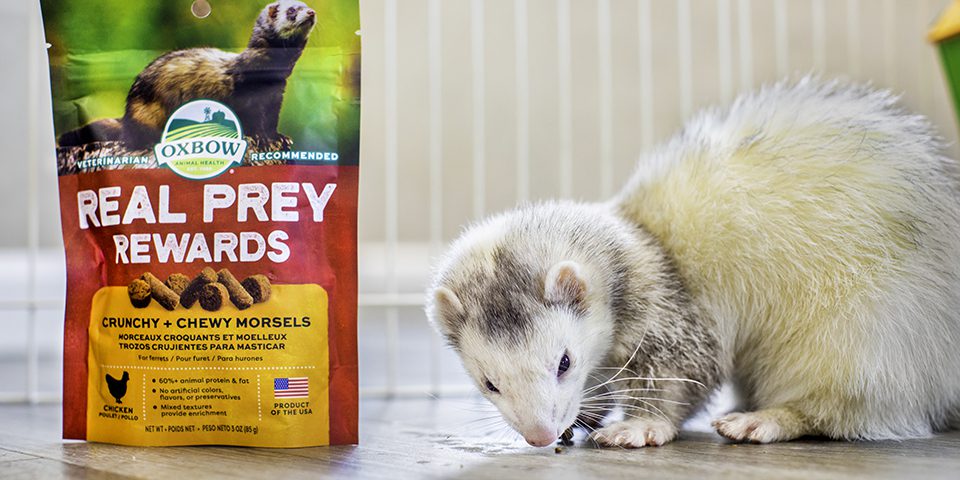Author: Patricia Larson, LVT
Updated: April 2 2024
People often ask me if ferrets can be trained. The answer is a resounding “yes!” Ferrets are incredibly smart and inquisitive creatures that can be trained to do all sorts of incredible things. In this article, we will cover key ferret training topics, including:
- Ferret Training Supplies
- Ferret Training First Steps
- How to Train Your Ferret to Not Bite
- How to Train Your Ferret to Come When Called
- Ferret Potty Training
- Other Ferret Training Activities
What Supplies Do You Need For Ferret Training?
There is a lot of information out there about essential training supplies, but it just comes down to what works best for your feisty friend. Learning the best way to train your ferret involves getting to know them.
Your Ferret’s Favorite Treats
The most important item that you need for ferret training is a good quality, species-appropriate treat that they adore. Ferrets respond well to positive reinforcement training so you need a treat that will make it worthwhile for them to do what you want them to. After all, they will do whatever you ask them if they love that reward. This might be a bit of ferret-safe jerky, a piece of chicken, a bit of fish oil, a tasty paste, or one of our Real Prey Rewards ferret treat options.
When getting started, I recommend getting a variety of treats so you can learn what motivates your mischievous friend. Keep treats protein-based, good quality, and keep the rewarded amount small. Remember: this is a reward, not a meal.
Are Clickers Essential For Ferret Training?
Clickers are small round pieces of plastic or metal that have a button. When you press the button it makes a distinct “click” sound. These are popular among dog trainers and while it is not essential to ferret training success, I recommend considering them. Think of the click as being a fast way of saying “good job!” It allows you to mark the exact moment your ferret does the desired behavior without any lag time and it can cut down on how long it takes your ferret to learn the trick.

How Do You Start Training Your Ferret?
1. Make A Plan
First and foremost, make a plan for your trick. What do you want your ferret to do? What will the trick look like? Have everything you need set up and decisions made beforehand to avoid confusing your ferret during training.
2. Start Small
Familiarize your ferret with the idea of being trained. If you choose to use a clicker, acclimate your ferret to the click equaling a treat. If you’re training without a clicker, start by training them to come when called (which we cover later in this blog). Starting with an easy task gets your ferret used to the training process and will get them invested in hanging in there for longer tasks later on.
3. Keep It Short, but Keep It Up
Anyone who has spent any time with ferrets knows that they do not have a long attention span. Don’t expect an hour-long training period from them; this will leave you frustrated and your ferret confused. Instead, engage in short training periods of just a few minutes several times a day. The key to ferret training is consistent, positive reinforcement.
4. Be Patient
Some tasks will be easy to train, while others will take longer. Some ferrets may need more coaxing than others to get into the training spirit. Just remember to be patient with them. It’s far better to take a break and do something else than get frustrated. A negative experience with training could remove your ferret’s willingness to try again.

What Type Of Ferret Training Should You Start With?
1. How to Train a Ferret Not to Bite
Getting started by training your kit to not bite is a wonderful way to get your ferret used to the training process and see you as an authority figure (not to mention the benefit to your fingers). The best way to start this process is simply by spending time with your little one. Socialization is the key to this process, especially if your ferret is quite young.
When you spend as much time as possible with your ferret, try sharing your day-to-day life with them. Let them play on the floor while you get ready for work or make dinner. Invite them to movie night. As long as you’re not using any harsh chemicals, let them help you with sweeping or cleaning (they’ll be great for dusting under the furniture!).
As a general training tip, ferrets hiss at one another to redirect bad behavior, so they associate this noise with saying “no” or “stop.” This is a great way to communicate with them while you’re teaching them to not bite or while they are being especially mischievous. Hiss at them if they jump on something they shouldn’t be on, if they are stealing something you don’t want to lose, or if they bite you.
If your ferret is being particularly naughty with biting and a simple hiss doesn’t dissuade them, then put your hand over the front of their body and press them gently to the floor while hissing. This is what mother ferrets do to their young and is similar to having your mom yell your first and middle names–it communicates that the situation is serious and that your ferret should listen.
Keep in mind that you should never “bop” or strike your ferret during the training process; animals are unlikely to associate this type of discipline with an undesired behavior of theirs, and will more likely come to associate you with being harmed.
2. Training Your Ferret To Come When Called
This trick can be a bit more complicated. Ferrets are similar to cats in that they might look at you when you call their name, but they aren’t as willing to come when called as a dog may be. You need to make it worth their while to drop what they’re doing and go to you. A box of treats or toys that you can shake and make a noise is a great way to get them interested. Call their name when you make the noise, and reward them with a treat and praise if they come running.

3. How to Potty Train a Ferret
Ferrets are fairly easy to litter box train. They naturally pick a few specific places to use the bathroom, and will generally choose a corner that they can back into. Unlike other animals ferrets are not prone to marking territories and you can anticipate where they might go potty.
Corner litter boxes with low entries and high backs are the standard choice for ferrets. Have at least one litter box in your ferret’s enclosure and a couple other boxes around the area they are playing outside of the enclosure. This way they don’t have to hustle back to their cage to use the restroom and accidents can be prevented during playtime. If you would rather not have litter boxes around, putting down pee pads can also work.
Ferrets will go to the bathroom about 15 minutes after they wake up, so let them go to the restroom before you let them out in the morning. They also have really short digestive tracts; food passes through their GI system about 3 hours after eating. Keeping these times in mind can offer you good time estimates to look for them doing their business. If you catch them using the litter box properly, make sure to reward them with a treat!
If your ferret has an accident outside their box, place some stool inside the litter pan to let them know that this is where they should go. If you catch them scooting backward into a corner, pick them up and place them in their litter box.
Make sure to be patient and avoid punishing your ferret for accidents; simply redirect them and try to catch them the next time to reward the desired behavior of using the litter box.
Ferret Training Next Steps – Rolling Over, Standing Up, And More!
Having these first few lessons successfully completed can open you and your ferret up to other tricks, like rolling over, standing up on their hind legs, giving a paw, or spinning in a circle on command. Teaching your ferret is a wonderful way to bond with them. Just make sure you make a plan for the trick, keep it short but consistent, and have patience.

